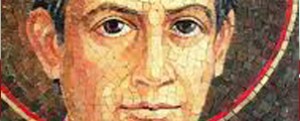The apostolic prayer
This is a prayer widely used by Saint Anthony Mary Claret and that he himself includes in his Autobiography. With some slight variations from the original, it sounds like this:
“My Lord and Father, may I know you and make you known; may I love you and make you loved; may I serve you and make you served; may I praise you and make you praised by all creatures. Amen".
Claret adds more elements, but the essence is reduced to the set of the four verbs applied to God: know, love, serve and praise. With the initials of each of them, in Spanish, the word “casa” (house) is formed (conocer, amar, servir y alabar) It is a simple way to remember that Claret – like Jesus – dreamed of being in the Father’s house to devout himself to His affairs and not to his own interests or tastes. (more…)
Abbreviation “CMF”

The question that often arises among Claretians is when the abbreviation “CMF” first came into use. Delving into this query requires a journey through the historical context of the Claretians and their practices. The use of abbreviations, especially by Claretian presbyters, was not a sudden development but a gradual process that spanned several decades.
In the early years, Claretian priests would often sign their names with “P.” or “Pbro.,” indicating their status as priests. However, a lack of uniformity led some individuals to experiment with different abbreviations. According to Jesus Alvarez, a Claretian historian, the push towards a standardized abbreviation began in the Mission House of Segovia around the late 19th century. This effort aimed to distinguish Claretians from the secular clergy. (more…)

El petit imperi

The mission of Equatorial Guinea, or Spanish Guinea, or Fernando Póo, as it was called before independence, has a singular importance for us Claretians: (more…)

“Poesias dedicadas a la felis memoria del célebre y admirable… Mosen Anton Claret”
O Mosen Anton Claret,
Gran simbol de la virtut,
Deu conservi ta salut,
Varó prudent y discret.
Nostre Señor Jesucrist
De tan talent te ha dotat;
Que admiració tu has causat
A tots los que te han sentit. (more…)

April 15
“The doctors and Fathers of the Church say that if the tree is known by its fruits as it is written in the Gospel, what shall we say of Mary who has given birth to that blessed Fruit which Saint Elizabeth so much praised when she said: Blessed is the fruit of your womb… Who am I that the Mother of God should visit me?” (Carta a un devoto del Corazón de María, en EC II, p. 1500s).
MARY, MOTHER OF GOD
A little known old proverb says: “the fish stuck out its head and the shores noticed it immediately”. Like all proverbs, it has its message. All my actions have repercussions and often someone feels the effect without knowing where it’s coming from. (more…)
Episode 2. The second episode titled “Nourishing the Fire” addresses aspects of the pre-founding and founding events of the Congregation helping the listener reflect on the importance of nourishing the fire of faith and vocation. Within the framework of the 175th anniversary of the foundation, our General Government in association with the CESC publishes different episodes explaining our history. You can access them in this Videos section of the Congregation’s website ( https://www.claret.org/audio-visual/ ).

















